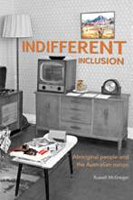Indifferent Inclusion: Aboriginal people and the Australian nation
Summary
McGregor offers a holistic interpretation of the complex relationship between Indigenous and settler Australians during the middle four decades of the twentieth century. Combining the perspectives of political, social and cultural history in a coherent narrative, he provides a cogent analysis of how the relationship changed, and the impediments to change.
McGregor’s focus is on the quest for Aboriginal inclusion in the Australia nation; a task which dominated the Aboriginal agenda at the time. McGregor challenges existing scholarship and assumptions, particularly around assimilation. In doing so he provides an understanding of why assimilation once held the approval of many reformers, including Indigenous activists.
He reveals that the inclusion of Aboriginal people in the Australian nation was not a function of political lobbying and parliamentary decision making. Rather, it depended at least as much on Aboriginal people’s public profile, and the way their demonstrated abilities partially wore down the apathy and indifference of settler Australians.
Russell McGregor is Associate Professor of History at James Cook University in Townsville. He has published extensively on the history of settler Australian attitudes toward Aboriginal people, including the award-winning book Imagined Destinies. His other research interests are in Australian nationalism and environmental history.
Shortlisted for the 2012 Prime Minister's Literary Award Prize for Australian History.
Endorsements
'This is an important book, covering the years from federation to the 1970s. It begins with the Day of Mourning’s Manifesto of 1938 that called for equality, respect and inclusion in the nation.
The book covers much familiar ground for the initiated, but features many new or under-researched elements, and presents them in a unique and nuanced argument about relations within the nation, which encompasses the much-maligned assimilation policy. Allegedly, Australians on the right favour assimilation while those on the left and Aboriginal people oppose it. Russell McGregor reveals these positions as caricatures by showing the complexities of the policy and how it was imagined and contested at each stage and over time.
Russell McGregor is one of the foremost scholars in the field of Aboriginal history. The very title of the book breaks new ground because of the questions implicit in its approach…his perspective is genuinely fresh and insightful.'
— Historian Mark McKenna
'Russell’s beautifully weighted work ends with an appeal — to do much better than continue to consider issues of the national inclusion of Aboriginal Australians as polarized polemic.
His hope is that tracking “the tentative steps of the past” will encourage settler Australians to be more willing to consider, perhaps even embrace, the full inclusion of Aboriginal people in the Australian nation.
If that does not happen, it won’t be for wont of putting in place an eminently readable account of the history of Aboriginal inclusion during the middle 20th century.
Russell, I applaud your work and I applaud you for it.'
— Professor Sandra Harding, Vice Chancellor, James Cook University (extract from launch speech)
